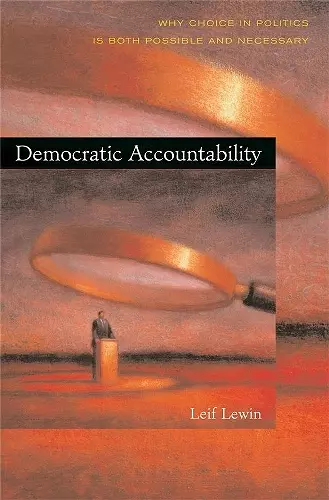Democratic Accountability
Why Choice in Politics Is Both Possible and Necessary
Format:Hardback
Publisher:Harvard University Press
Published:14th Apr '07
Currently unavailable, and unfortunately no date known when it will be back

This is a powerful book about the relationship between citizens and leaders in a democracy. The former and the latter are linked by accountability, the concept that Lewin places at the heart of his analysis. The analysis is clear, the case studies illustrating the analysis are compelling. This work will occupy an important place on the bookshelf of democratic politics. -- Sidney Verba, Harvard University Democratic Accountability ascends far above both the meticulous methodological commitments so dominant in contemporary political science and the tediously trivial arguments advanced by so much contemporary political research to embrace fundamental questions of the first importance in a manner both lively and informative. This is a most original and striking book, both in the sheer erudition Lewin displays and the moral urgency that animates the work. -- Russell Muirhead, The University of Texas at Austin This is an intriguing book in the field of policy analysis. Lewin gives seven arguments and counter-examples from the historical, philosophical, and policy analysis literatures to make the point that "Choice is possible!." This is an excellent strategy, and makes a very novel and engaging book. -- Eleanor Ostrom, Indiana University
In a staunch defense of the possibility for meaningful and profound democratic decision making, Lewin finds that, not only do political leaders exert enough control to be assigned responsibility, but also that the meaning of a functioning democracy requires the people to hold their leaders accountable.
It is common for political leaders to claim they have no control over bad outcomes. Indeed, they often cite the arguments of political theorists and public intellectuals as to why: history rushes onward oblivious of human will; force and violence overcome political aims; globalization undermines the actions of national leaders; the bureaucracy sabotages their intentions; bad outcomes are often the unintended result of actions.
In Democratic Accountability, Leif Lewin examines these reasons and argues that they are unconvincing. He makes his case by describing and analyzing counterexamples in seven cases, including the prevention of a communist takeover in Europe after World War II, the European Union's preventing another European war, and Margaret Thatcher's taming of the bureaucracy in Britain. In a staunch defense of the possibility for meaningful and profound democratic decision making, Lewin finds that, in fact, not only do political leaders exert a good measure of control and therefore can be assigned responsibility, but the meaning of the functioning democracy is that the people hold their leaders accountable.
This is a powerful book about the relationship between citizens and leaders in a democracy. The former and the latter are linked by accountability, the concept that Lewin places at the heart of his analysis. The analysis is clear, the case studies illustrating the analysis are compelling. This work will occupy an important place on the bookshelf of democratic politics. -- Sidney Verba, Harvard University
Democratic Accountability ascends far above both the meticulous methodological commitments so dominant in contemporary political science and the tediously trivial arguments advanced by so much contemporary political research to embrace fundamental questions of the first importance in a manner both lively and informative. This is a most original and striking book, both in the sheer erudition Lewin displays and the moral urgency that animates the work. -- Russell Muirhead, The University of Texas at Austin
This is an intriguing book in the field of policy analysis. Lewin gives seven arguments and counter-examples from the historical, philosophical, and policy analysis literatures to make the point that "Choice is possible!." This is an excellent strategy, and makes a very novel and engaging book. -- Eleanor Ostrom, Indiana University
In this stimulating analysis, Leif Lewin wrestles with one of the most frustrating problems of contemporary democracy, the difficulty of holding elected leaders responsible for policies. The difficulty is based on the objective complexity and interdependence of policymaking in the modern state and on the tendency of politicians to use that context deliberately to avoid responsibility when policies go bad. The temptation, of course, is understandable, although not, as Lewin reminds us, ethically excusable. -- G. Bingham Powell, Jr. * Political Science Quarterly *
- Nominated for Best Book Award in Comparative Democratization 2008
- Nominated for David Easton Award 2008
ISBN: 9780674024755
Dimensions: unknown
Weight: unknown
264 pages